Keeping your cat healthy is essential for their overall well-being and feline wellness. By incorporating daily habits and providing proper care, you can ensure that your beloved feline companion stays happy and thriving.
One of the key aspects of cat health care is maintaining their coat. Regular brushing not only reduces hairballs but also helps prevent matting. Additionally, it’s important to feed your cat a meat-based diet that is low in carbohydrates, as this mirrors their natural carnivorous diet.
Access to fresh water is crucial for a cat’s hydration. Cats naturally have lower water intake compared to dogs, so providing fresh water at all times is essential, especially for cats on a dry food diet. Wet food is recommended as it has a higher water content.
Setting up multiple litter boxes in accessible locations is important to prevent your cat from eliminating outside the box. Cats prefer clean litter boxes, so scooping waste daily and cleaning the litter box regularly are essential.
Grooming is another important aspect of cat health care. Regular brushing of the coat helps prevent hairballs, matting, and skin infections. It’s also important to trim your cat’s nails and clean their teeth to maintain their overall health.
Regular vet visits are crucial for preventive care and addressing any health concerns. Annual check-ups and vaccinations are recommended, and senior cats should be seen twice a year. Your vet can provide preventive care measures such as flea and tick control, heartworm medications, and dental care.
Mental stimulation is important for your cat’s overall well-being. Providing playtime, interactive toys, and access to outdoor stimulation can keep your cat mentally engaged and prevent boredom-related behavior issues.
When it comes to traveling with your cat, having a suitable cat carrier is essential for their safety. Cats should never be left alone in a parked car, as it can be dangerous for their health.
Now that you are aware of these essential tips for optimal cat health care, you can ensure that your feline companion lives a happy and healthy life.
Key Takeaways:
- Regular grooming, including brushing the coat, trimming nails, and cleaning teeth, is essential for cat health care.
- Providing fresh water at all times and feeding a meat-based diet that is low in carbohydrates helps maintain optimal cat health.
- Setting up multiple litter boxes in accessible locations helps prevent your cat from eliminating outside the box.
- Regular vet visits, including vaccinations and preventive care measures, are crucial for cat health maintenance.
- Mental stimulation through playtime and interactive toys is important for a cat’s overall well-being.
Importance of a Balanced Diet for Cat Health
Providing your cat with a balanced diet is crucial for their overall health and well-being. As obligate carnivores, cats require a diet rich in high-quality protein to thrive.
A cat nutrition guide advises opting for wet food over dry food, as it provides the necessary moisture and a healthier balance of carbohydrates. Wet food also helps prevent dehydration, which is especially important for cats on a dry food diet.
Portion control is another vital aspect of cat nutrition. Feeding dry food requires careful monitoring to prevent overeating and obesity. Consultation with a veterinarian can help determine the appropriate portion sizes for your cat’s individual needs.
Remember, maintaining a balanced diet for your cat is essential for their feline wellness and longevity.
Quote:
“Feeding your cat a balanced diet is key to their overall health. Ensure their meals include high-quality protein and the right balance of carbohydrates for optimal nutrition.” – Dr. Sarah Johnson, Veterinarian
Providing your furry friend with the right nutrition is an investment in their long-term health and happiness. So, be sure to consult with a professional to develop a cat nutrition guide tailored specifically to your cat’s needs.
Stay tuned for Section 3, which delves into the importance of hydration and water consumption for cats.
Hydration and Water Consumption for Cats
While cats are known for their independent nature, it’s important to remember that they still rely on us for their well-being, including their hydration needs. Cat health and feline wellness greatly depend on proper water consumption. Here are some cat care tips to ensure your feline friend stays hydrated:
Provide Fresh Water at All Times
Cats naturally have lower water intake compared to dogs, so it’s essential to have fresh water available at all times. Place multiple water bowls throughout your home, and ensure they are easily accessible to avoid any hindrance to your cat’s drinking habits.
Consider a Diet with Higher Water Content
Cats on a dry food diet may have a harder time staying properly hydrated. Consider incorporating wet or canned food into their diet, as it contains a higher water content. This not only helps in maintaining cat health, but also promotes proper digestion.
Monitor Water Intake for Specific Needs
Some cats have specific needs when it comes to their water intake. Senior cats, nursing cats, and cats with certain health conditions are more prone to dehydration. It’s crucial to pay special attention to their water consumption and monitor it closely.
“Maintaining proper hydration is vital to a cat’s overall health and can greatly impact their well-being. Ensuring they have access to fresh water and considering the water content of their diet are key factors to prevent dehydration.”
| Signs of Dehydration in Cats | Prevention and Care |
|---|---|
|
|
By following these cat care tips and monitoring your cat’s water consumption, you can help maintain their cat health and ensure they stay hydrated. Remember, a well-hydrated cat is a happy and healthy companion.
Proper Litter Box Setup and Maintenance
When it comes to maintaining your cat’s health, proper litter box setup and maintenance are crucial. Cats are naturally clean animals and prefer a clean and odor-free environment for eliminating waste. Here are some essential tips to ensure your cat’s litter box experience is pleasant and hygienic:
1. Provide Sufficient Litter Boxes
It’s important to have one litter box per cat in your household, plus an extra one. This ensures that each cat has their own designated space and reduces the chances of territorial disputes.
2. Choose the Right Location
Place the litter box in a quiet and accessible area of your home. Cats prefer privacy and may avoid using the litter box if it’s located in a high-traffic or noisy area.
3. Clean the Litter Box Regularly
Scooping the litter box daily is essential to prevent the buildup of waste and odor. Cats are clean animals and may refuse to use a dirty litter box, leading to accidents outside the box. Additionally, it’s recommended to thoroughly wash the litter box with mild detergent and water at least once a week.
4. Replace the Litter Box Annually
Over time, the plastic material of the litter box can develop scratches and absorb odors despite regular cleaning. It’s advisable to replace the litter box annually to maintain a hygienic environment for your cat.
By following these litter box setup and maintenance tips, you can ensure that your cat always has access to a clean and comfortable space for eliminating waste.
Importance of Regular Grooming for Cat Health
Grooming plays a vital role in maintaining the overall health and well-being of your cat. Regular grooming sessions help prevent common cat health issues such as hairballs, matting, and skin infections. Additionally, grooming provides an opportunity to bond with your furry friend while keeping an eye out for any potential health concerns. Here are some essential cat care tips for effective grooming:
Brushing the Coat
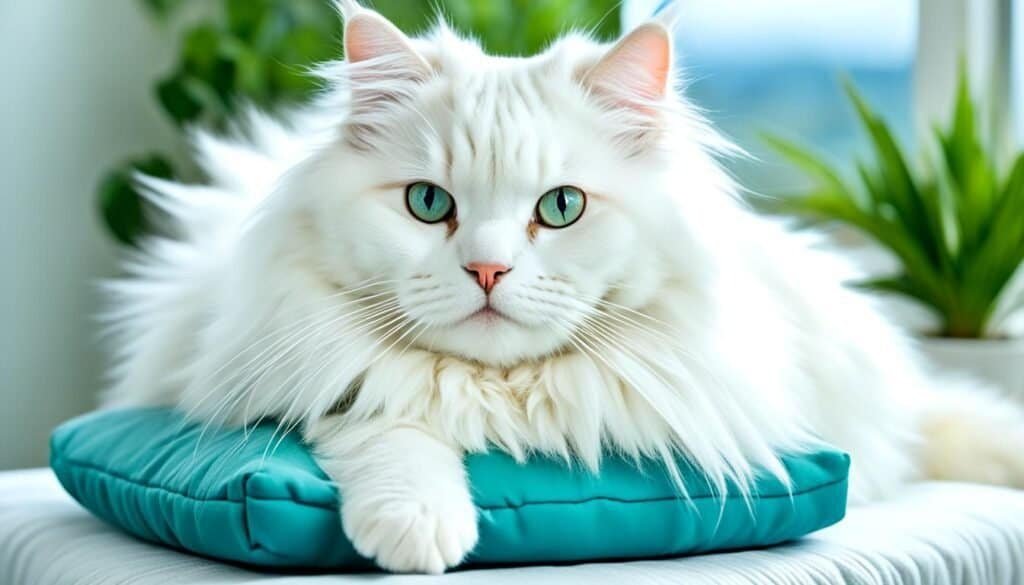 One of the key aspects of grooming is brushing your cat’s coat. Regular brushing helps remove loose fur, prevent matting, and distribute natural oils throughout the fur. It is particularly important for cats with long or thick coats. Brushing not only keeps your cat’s coat healthy and shiny but also reduces hairballs that can cause discomfort and digestive issues.
One of the key aspects of grooming is brushing your cat’s coat. Regular brushing helps remove loose fur, prevent matting, and distribute natural oils throughout the fur. It is particularly important for cats with long or thick coats. Brushing not only keeps your cat’s coat healthy and shiny but also reduces hairballs that can cause discomfort and digestive issues.
Trimming Nails
Trimming your cat’s nails is crucial for maintaining their paw health and preventing scratches or injuries. Using cat-specific nail clippers, trim the tips of your cat’s nails regularly. If you’re unsure about how to trim your cat’s nails, consult with your veterinarian or a professional groomer.
Cleaning Teeth
Oral health is an essential part of overall cat care. Regularly cleaning your cat’s teeth helps prevent tartar build-up, gum diseases, and bad breath. Use cat-friendly toothbrushes and toothpaste to gently brush their teeth. If your cat resists tooth brushing, consult your veterinarian for alternative dental care options.
“Regular grooming not only keeps your cat looking their best but also helps maintain their health and prevents common issues.”
By incorporating regular grooming into your cat care routine, you can ensure their coat stays healthy and free from matting, while also promoting good dental hygiene. Additionally, grooming sessions provide an excellent opportunity for you to bond with your cat and spot any potential health concerns early on. Keep your cat’s well-being in mind and make regular grooming an essential part of their care.
Preventive Veterinary Care for Cats
Regular veterinary care is essential for maintaining your cat’s health and preventing common cat health issues. By prioritizing preventive care, you can ensure that your furry friend stays happy and healthy for years to come.
Annual Check-ups and Vaccinations
Scheduling annual check-ups for your cat is key to detecting any potential health problems early on. During these visits, the veterinarian will conduct a comprehensive physical examination, assess your cat’s overall health, and administer essential vaccinations to protect against common cat illnesses.
Senior Cats and Biannual Visits
Cats over the age of seven are considered seniors and may require more frequent veterinary check-ups. It is recommended to schedule biannual visits for senior cats, as their immune systems may weaken and they may be more prone to health issues.
Preventive Care Measures
Your veterinarian can provide various preventive care measures to safeguard your cat’s health. This may include flea and tick control to protect against external parasites, heartworm medications to prevent heartworm disease, and dental care to maintain optimal oral health. These preventive measures can help prevent common cat health issues and ensure your cat stays in top condition.
Regular vet visits play a critical role in maintaining your cat’s overall health and well-being. By staying proactive and taking preventive measures, you can minimize the risk of potential health problems and provide a happy, healthy life for your furry companion.
Addressing Health Concerns
In addition to preventive care, regular vet visits allow for the early identification and treatment of any health concerns. Your veterinarian can conduct diagnostic tests, provide appropriate treatment plans, and offer guidance on managing chronic conditions. Early intervention can significantly improve outcomes and quality of life for your cat.
Wellness Examinations
Wellness examinations are an integral part of preventive veterinary care for cats. These comprehensive check-ups include a thorough evaluation of your cat’s overall health, including weight management, dental health, and organ function. Your veterinarian can offer personalized advice and recommendations to optimize your cat’s well-being.
Educational Resources and Cat Care Tips
In addition to providing preventive veterinary care, your veterinarian can offer educational resources and cat care tips to support your efforts in maintaining your cat’s health. They can provide guidance on nutrition, behavior, grooming, and other aspects of cat care, ensuring that you have the knowledge and tools to be a responsible and knowledgeable cat owner.
| Preventive Veterinary Care Services | Benefits |
|---|---|
| Annual check-ups | Early detection of health issues |
| Vaccinations | Protection against common cat illnesses |
| Flea and tick control | Prevention of external parasites |
| Heartworm medications | Prevention of heartworm disease |
| Dental care | Maintenance of optimal oral health |
By prioritizing preventive veterinary care for your cat, you can ensure their well-being and minimize the risk of common cat health issues. Regular check-ups, vaccinations, preventive care measures, and addressing health concerns are all crucial components of maintaining your feline companion’s health.
Providing Mental Stimulation for Cat Health
Mental stimulation plays a crucial role in maintaining your cat’s overall well-being. Engaging your feline friend in various activities can prevent boredom-related behavior issues and promote a healthy, happy life. Here are some effective ways to provide mental stimulation for your cat:
1. Playtime
Playtime is an essential part of cat care. Interactive play sessions using toys like feather wands, laser pointers, and small balls can keep your cat mentally and physically active. Allocate at least 10-15 minutes each day for dedicated playtime with your furry companion.
2. Interactive Toys
Investing in interactive toys can provide hours of entertainment for your cat. These toys usually involve puzzles, hidden treats, or moving parts that require your cat to actively engage and problem solve.
3. Puzzle Toys
Puzzle toys are designed to stimulate your cat’s problem-solving abilities. These toys often require your cat to figure out how to retrieve treats or toys from hidden compartments, promoting mental agility and preventing boredom.
4. Outdoor Stimulation
Providing access to outdoor stimulation, such as a bird feeder placed near a window, can captivate your cat’s attention and offer a glimpse into the natural world. Ensure your cat’s safety by ensuring they cannot physically access any outdoor wildlife.
“Mental stimulation is essential for a cat’s overall happiness and can help prevent destructive behaviors caused by boredom.” – Dr. Sarah Thompson, DVM
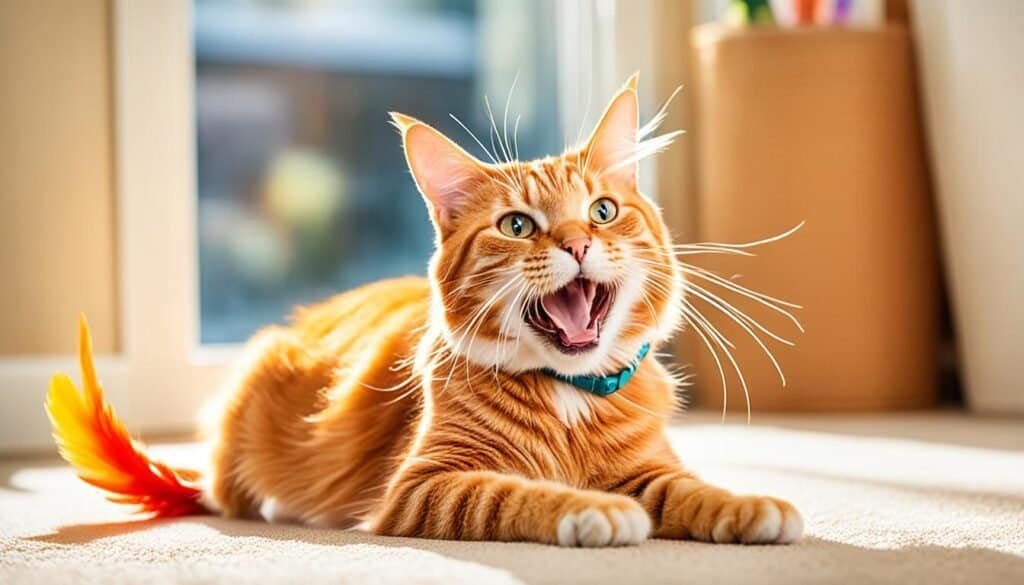
Importance of Proper Cat Carrier and Travel Safety
When it comes to traveling with your feline friend, having a suitable cat carrier is crucial for their safety and well-being. Whether you’re heading to the veterinarian, going on a road trip, or taking a flight, ensuring your cat’s comfort and security is essential.
A medium-sized cat carrier that loads from the top is recommended, especially for cats who may be resistant to entering a carrier. This design allows for easy access and minimizes stress during the loading and unloading process.
While traveling, it’s important to never leave your cat alone in a parked car. The temperature inside a vehicle can rise quickly, leading to heatstroke and other health complications. Always ensure your feline companion is safely secured and properly supervised.
When visiting the veterinarian, consider choosing a practice that offers separate waiting areas for cats and dogs. This helps reduce stress and anxiety for cats, creating a more peaceful environment during their vet visits.
Travel Safety Tips for Senior Cats
Senior cats require extra care and attention during travel. Here are a few tips to ensure their safety:
- Consult with your veterinarian before traveling with a senior cat to address any specific health concerns or considerations.
- Provide comfortable bedding in the carrier to minimize stress on arthritic joints and provide a cozy resting place.
- Make sure your senior cat is up to date on vaccinations and has any necessary medications for the duration of the trip.
- Take frequent breaks during long car journeys to allow your cat to stretch their legs, use a litter box, and have access to fresh water.
By taking these precautions and prioritizing your cat’s comfort and safety, you can ensure a smooth and stress-free travel experience for both you and your feline companion.
Conclusion
Taking care of your cat’s health is vital to ensure their overall well-being and longevity. By following these essential cat care tips, you can provide optimal feline wellness and support their physical and mental health.
Regular vet visits are crucial for preventive care and early detection of any health issues. Make sure to schedule annual check-ups and vaccinations, and if your cat is seven years or older, consider visiting the veterinarian twice a year to address potential age-related concerns.
In addition, a balanced diet is vital for your cat’s nutrition. Opt for a meat-based diet that is low in carbohydrates and consider incorporating wet food, which can help with hydration. Fresh water should be available at all times to ensure your cat stays well-hydrated.
Clean litter boxes, regular grooming sessions, and mental stimulation are also essential for your cat’s health and well-being. Provide a clean litter box environment with one box per cat plus an extra, and maintain regular grooming sessions to prevent hairballs and skin infections. Engage your cat with interactive toys, puzzle toys, and playtime to keep them mentally stimulated, happy, and prevent boredom-related behavior issues.
Lastly, ensure safe travel practices by having a suitable cat carrier and never leaving your cat alone in a parked car. Consider using a carrier that loads from the top for easier access and less stress on your cat. These practices contribute to their safety and overall cat health care.
FAQ
How can I keep my cat healthy?
What should I feed my cat?
How can I ensure my cat stays hydrated?
How many litter boxes should I have for my cat?
Why is regular grooming important for my cat?
How often should I take my cat to the vet?
How can I provide mental stimulation for my cat?
Why is it important to have a proper cat carrier for travel?
How can I ensure the overall health of my cat?
Last modified: February 20, 2024

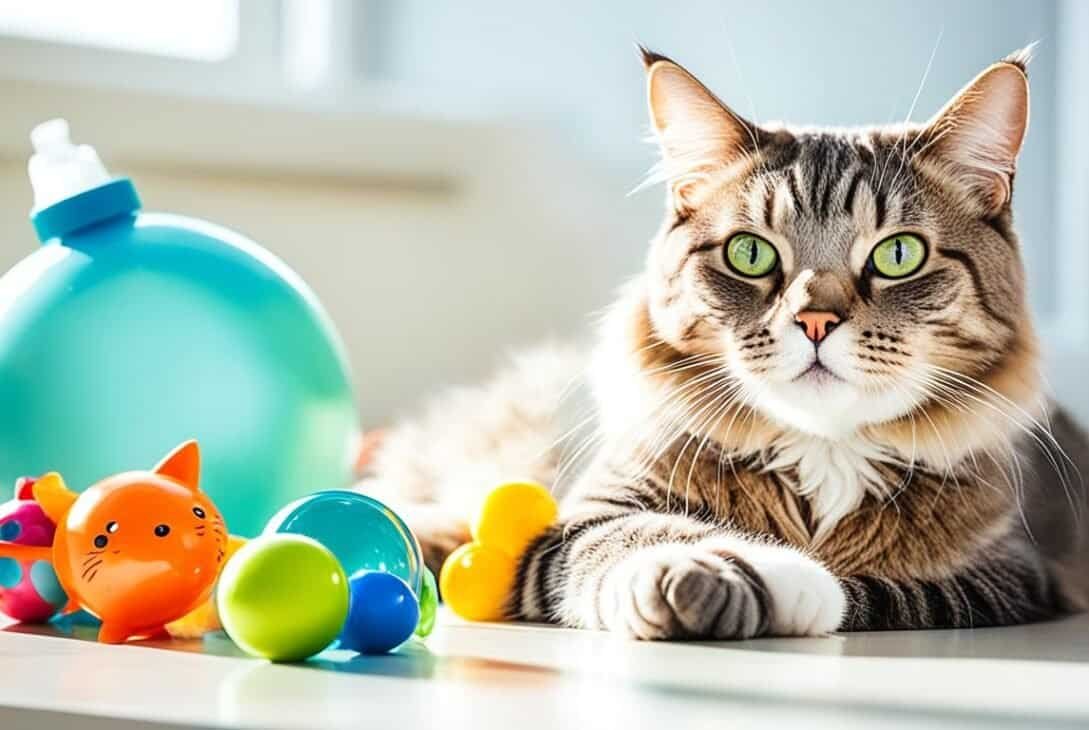
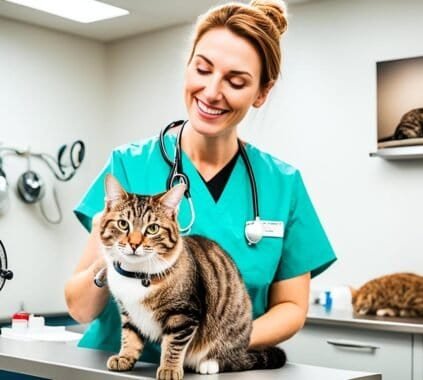

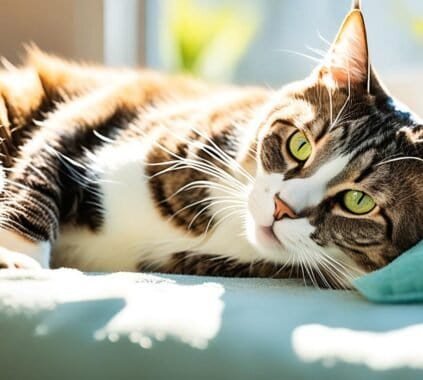
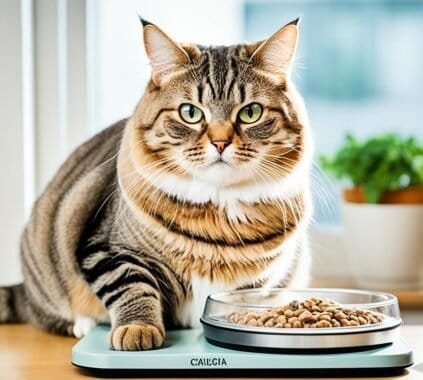

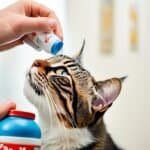





[…] Diet and Nutrition: During health check-ups, veterinarians can assess your cat’s diet and offer guidance on any necessary adjustments. Cats’ nutritional needs may vary based on their age, activity level, and overall health condition. Regular check-ups help ensure that your cat’s dietary requirements are met for optimal health. […]
[…] the signs of aging in cats and address common health issues […]
[…] Year-round prevention is essential in managing internal parasites and protecting your cat’s health. […]
[…] Proper care and maintenance are essential for ensuring the overall health and well-being of your feline companion. By paying attention to your cat’s behavior and routine, you can identify any potential issues and take appropriate measures to address them. Here are some valuable tips for maintaining general cat health: […]
[…] it comes to ensuring your cat’s health and well-being, choosing the right cat food is essential. By understanding how to read nutrition […]
[…] your veterinarian will help you establish a well-rounded weight-loss plan that prioritizes your cat’s health and […]